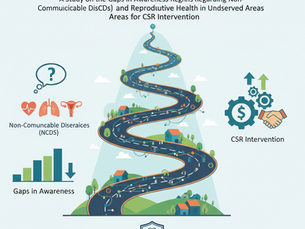Collaboration with
RAMNATH PRASAD
INSTITUTE OF HIGHER
EDUCATION FOUNDATION
International Journal for Neurology and Neuroscience
International Journal for Cardiovascular and General Surgery
Contact us
Registered Office:- New Delhi, India
Administrative Office
Near RP Hospital Road, NH-527D,
East Champaran, Bihar-845433
Website: www.ncncr.com
Email: Info@ncncr.com
राष्ट्रीय तंत्रिका विज्ञान और नैदानिक अनुसंधान केंद्र

Corporate Social Responsibility (CSR) initiatives have the potential to address these gaps, but effective intervention requires a clear understanding of where and what the knowledge deficits are. This study, titled "Mapping the Health Information Landscape," is designed to provide a comprehensive analysis of the existing awareness gaps regarding NCDs and reproductive health in specific underserved areas. By employing a systematic approach to data collection, this research aims to identify critical knowledge deficiencies within the target population. The findings of this study will serve as an evidence-based blueprint for corporations and other organizations, enabling them to design and implement highly targeted, impactful, and sustainable CSR health interventions that truly meet the needs of these communities.


Viral diseases, or virology diseases, are a diverse group of illnesses caused by viruses. These diseases range from common and relatively mild conditions like the common cold and influenza to severe, life-threatening pandemics such as COVID-19, Ebola, and HIV/AIDS. The study of virology diseases encompasses several key areas: understanding the structure and life cycle of viruses, the mechanisms by which they infect and cause harm to their hosts, how the host's immune system responds, and the development of diagnostic tools, antiviral drugs, and vaccines. Advances in virology have been instrumental in controlling and even eradicating some of the most devastating diseases in human history, highlighting the critical importance of this field in public health and medicine.

There are two main types of diabetes. Type 1 diabetes is an autoimmune disease where the body's immune system mistakenly attacks and destroys insulin-producing cells in the pancreas. This necessitates lifelong insulin therapy. Type 2 diabetes, the more common form, is often associated with insulin resistance, where cells fail to use insulin properly, and a relative lack of insulin production. It is frequently linked to lifestyle factors such as obesity and physical inactivity. Over time, poorly controlled diabetes can lead to severe health complications, including cardiovascular disease, kidney failure, nerve damage, and vision loss. Management involves a combination of medication, dietary control, regular physical activity, and consistent monitoring of blood glucose levels. Early diagnosis and proactive management are key to preventing long-term complications and improving quality of life.


Measured in millimeters of mercury (mmHg), blood pressure is typically recorded as a ratio (e.g., 120/80 mmHg). Maintaining a healthy blood pressure is crucial for cardiovascular health. High blood pressure, or hypertension, forces the heart to work harder, which can lead to a number of serious health problems, including heart disease, stroke, and kidney failure. Conversely, low blood pressure, or hypotension, can cause dizziness and fainting due to inadequate blood flow to the brain and other vital organs. Understanding and monitoring blood pressure is a key component of preventative healthcare, offering vital insights into an individual's overall well-being.

Understanding the causes, symptoms, and progression of diseases is crucial for effective prevention, diagnosis, and treatment. While some diseases are genetic, others are influenced by environmental factors, lifestyle choices, and socioeconomic conditions. Public health initiatives, medical research, and advancements in technology play a vital role in combating diseases and improving global health outcomes. By promoting healthy habits, providing access to quality healthcare, and fostering a collaborative approach, we can strive towards a healthier future for all.

The scope of pharmacy research is broad, including several key areas. Pharmaceutical sciences focus on the creation of new drugs, studying their chemical composition, how they're delivered to the body (e.g., in a tablet or injection), and their stability. Another crucial area is pharmacology, which studies how drugs interact with the body, including their effects and potential side effects. Finally, pharmacy practice research examines the clinical and social aspects of medication use, such as patient safety, health policy, and the role of pharmacists in healthcare systems. By blending these disciplines, pharmacy research builds the evidence base that underpins modern medicine and continually advances the standards of patient care.

Projects by NCNCR


Mapping the Health Information Landscape: A Study on the Gaps in Awareness Regarding Non-Communicable Diseases (NCDs) and Reproductive Health in Underserved Areas for CSR Intervention


Examining the Link Between Menstrual Health Awareness and Women's Productivity and School Attendance in a Developing Region: A CSR Impact Assessment


The "Healthy Heart, Healthy Life" Project: A CSR-Supported Study on the Effectiveness of Workplace Health Screenings and Educational Workshops in Reducing Cardiovascular Risk Factors


Evaluating the Long-Term Behavioral Changes and Health-Seeking Behaviors After a Corporate-Funded Awareness Program on Cardiac and Reproductive Health for Employees and Their Families


A Study on the Efficacy of Corporate-Sponsored Health Camps in Improving Knowledge of Heart Attack Symptoms and Menstrual Health Practices in Urban Slums
Conference
Empowering Rural Youth
Join us in our mission to provide educational resources and support to underprivileged children, ensuring they have access to quality education, Health and mentorship for a brighter future.
National Centre for Neurology and Clinical Research
Mental Health, Neurodevelopmental Disorders, Epilepsy and Seizure Disorders, Mobile Medical Units, Public Awareness Campaigns, Maternal and Child Health, Cancer Research, Cardiovascular Diseases, Sickle Cell Anemia, Sanitation, and Hygiene, Translational Research ,Medical Device Innovation , Respiratory Health, Hygiene.
News for Healthy Health



 Conference on Neurological Disorder for Rural area Population 20257 days to the eventTue, 07 OctLonsdale
Conference on Neurological Disorder for Rural area Population 20257 days to the eventTue, 07 OctLonsdale
 Conference on Alzheimer's, Disease for Rural area Population 2024Thu, 13 JunTirhut Division
Conference on Alzheimer's, Disease for Rural area Population 2024Thu, 13 JunTirhut Division
 Conference on Neurological Disorders 2023Fri, 18 AugOnline Conference
Conference on Neurological Disorders 2023Fri, 18 AugOnline Conference
.png)